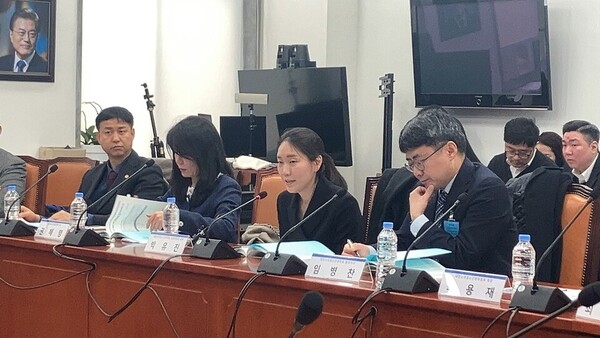Pediatric patients have nowhere to go.
The healthcare delivery system is in crisis, as repeatedly shown by ER wandering and the rush of people to pediatric clinics at opening hours to secure treatment.

The medical community points out that the tentatively titled “Basic Pediatric and Adolescent Health Act" is necessary to restore the medical delivery system and promote continuous healthcare policies.
Experts discussed these issues at a field meeting on Wednesday hosted by the Democratic Party of Korea (DPK)'s Public Livelihood Recovery Team, focusing on pediatric care disruptions and the shortage of essential pediatric drugs.
Pediatric specialists said that the decline in support for trainee doctors over the past several years, worsened by the protracted medical turmoil, has led to a crisis in the ability of tertiary hospitals to respond to critically ill children.
“The pediatric departments at tertiary hospitals have been facing a shortage of medical residents for years and a prolonged medical turmoil since last year, which has increased the workload of doctors as they treat many patients,” said Park Yoo-jin, a member of the Insurance Committee of the Korean Pediatrics Society.
Park noted that as available resources, including beds, are saturated, smooth referrals from primary and secondary hospitals to tertiary hospitals are difficult.
Park stressed the need to establish a stable system centered on specialists by increasing the number of pediatric specialists to restore the capacity of tertiary hospitals to treat severely ill pediatric patients.
“To establish a 24-hour pediatric specialist care system to overcome the shortage of personnel for inpatient care of critically ill patients, government support for labor costs is essential so that tertiary training hospitals can hire clinical professors and dedicated specialists,” Park said.
To build a stable specialist-centered system and continuously cultivate specialized personnel, Park also emphasized the need to increase the number of pediatric subspecialists as an incentive and to realize a number that reflects the risk level for examination and treatment.
“Fees for inpatient treatments should also be drastically increased, and the deficit compensation applied to public children's hospitals should be expanded to tertiary hospitals,” Park said.
Choi Yong-jae, president of the Korea Children’s Hospital Association, said, “Pediatric and adolescent hospitals serve as emergency rooms. They lack the capacity to respond when pediatric patients become critically ill. We need to find a way to save them.”
To do this, it is important to restore the role of tertiary hospitals. Only then can secondary hospitals also build their capacity, Choi said.
Lim Byung-chan, director of general affairs at the Korean Pediatric Society, said, “There are various needs to solve pediatric medical problems, but it is difficult to solve them all at once. What we propose as a long-term measure is to include the obligations of central and local government agencies in the Basic Pediatric and Adolescent Health Act as a measure to overcome the ultra-low birthrate and pediatric medical crisis.”
The Democratic Party of Korea said it would consider supporting pediatrician labor costs, tackling the unstable supply of medicines, including avoided but essential drugs, and helping Moonlight (Night-time) Children's Hospitals in the supplementary budget. The main opposition party also said it would actively promote the enactment of the Basic Pediatric and Adolescent Health Act.
“The low birthrate is the most serious problem in our society. It doesn't make sense that we are not creating a system and society that can raise children well while telling them to have more children,” Rep. Kim Yoon said. “In that sense, the Basic Pediatric and Adolescent Health Act is essential.”
The DPK will consider supporting labor costs for pediatric specialists at university hospitals, helping to guarantee the stable supply of medicines by preventing the exits of essential drugs from markets, and providing financial support for Moonlight Children's Hospitals by including them in the supplementary budget,” Kim said.
(Caption)
Park Yoo-jin (third from left), a member of the Insurance Committee of the Korean Pediatric Society, called for supporting pediatric care at a meeting to discuss how to solve the problem of pediatric medical disruptions and out-of-stock essential medicines held by the Democratic Party of Korea on Wednesday. (KBR photo)
Related articles
- Government to raise emergency care fees for hospitals by up to 300% during Lunar New Year holiday
- [Interview] ‘Pediatric care will revive, so don't give up and stay with us’
- Only 8.5% of emergency hospitals provide 24-hour pediatric treatment due to lack of follow-up care
- National university children's hospitals falter due to prolonged medical turmoil
- SNUBH opens 1st pediatric ICU in Gyeonggi Province
- Special incentives fail to bring back resigned junior doctors, with only 2.2% reapplying for medical residency
- Unable to function properly, more emergency rooms may shut down
- Pediatric heart surgeons struggle to bill for life-saving procedures amid outdated coding system
- Pediatric emergency center designation stalled due to lack of hospital applicants
- US Embassy warns American travelers as Korea's doctor shortage disrupts emergency care
- 'Policy determines pediatric survival, worsening inequality'
- Pediatricians pin hopes on new health minister to rebuild child healthcare
- Children’s hospitals call for overhaul of nighttime and holiday care system

